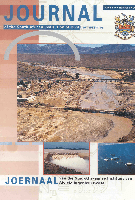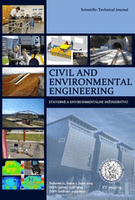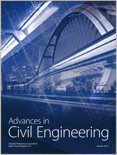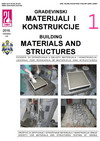
Journal of the South African Institution of Civil Engineering
metrics 2024
Connecting professionals to shape the future of engineering.
Introduction
Journal of the South African Institution of Civil Engineering (ISSN: 1021-2019) is a distinguished open-access publication dedicated to advancing the field of civil engineering in South Africa and beyond. Established by the South African Institution of Civil Engineering (SAICE) and South African Institute of Steel Construction (SAISI), it serves as a critical platform for sharing research, case studies, and industry developments. The journal has been openly accessible since 2015, ensuring broader dissemination of knowledge among researchers, professionals, and students alike. Although it currently holds a Q4 ranking in Civil and Structural Engineering and is positioned within the lower percentiles in Scopus rankings, its commitment to fostering growth in the engineering sector remains strong. Covering various topics from structural design to innovative construction methodologies, the journal invites contributions that push the boundaries of current practices and methodologies. This publication is essential for those invested in sustainable engineering solutions, aiming to collaborate and contribute towards the evolution of civil engineering standards in South Africa.
Metrics 2024
 0.16
0.16 0.40
0.40 0.60
0.60 22
22Metrics History
Rank 2024
Scopus
IF (Web Of Science)
JCI (Web Of Science)
Quartile History
Similar Journals

Civil and Environmental Engineering
Advancing knowledge for sustainable infrastructure.Civil and Environmental Engineering, published by SCIENDO, is a prominent open-access journal dedicated to advancing research and knowledge in the fields of civil and structural engineering, as well as environmental engineering. Since its inception in Germany, it has been committed to promoting cutting-edge studies and methodologies that address the pressing challenges in these domains. With an ISSN of 1336-5835 and E-ISSN of 2199-6512, the journal is accessible to a global audience, having adopted an open-access policy since 2014 to enhance the visibility and dissemination of scholarly work. The journal currently holds a Q3 ranking in both Civil and Structural Engineering and Environmental Engineering, as of 2023, reflecting its growing influence within the academic community. It operates within a framework of rigorous peer-review standards and encourages contributions that not only contribute to theoretical advancements but also have practical implications for real-world applications. Researchers, professionals, and students alike will find invaluable insights and innovative perspectives in the latest studies published from 2018 to 2024.

KSCE Journal of Civil Engineering
Championing Quality Research in Civil EngineeringKSCE Journal of Civil Engineering is a prestigious international publication dedicated to advancing the field of civil engineering. Established by the Korean Society of Civil Engineers (KSCE), this journal serves as a vital platform for high-quality research in the discipline, showcasing innovative methodologies, case studies, and critical analyses pertinent to civil and structural engineering. With an impact factor placing it in the Q2 category of civil engineering journals for 2023 and a solid Scopus rank of #141 out of 379, it reflects the significant contributions of its authors and the growing recognition of its published works. KSCE Journal of Civil Engineering, based in Germany and easily accessible to the global research community, is committed to disseminating knowledge with rigor and integrity, encouraging both emerging scholars and seasoned experts to contribute to the evolving discourse in civil engineering. With a convergence period from 2009 to 2024, the journal continues to uphold its mission of fostering innovation and excellence in engineering practice.

Revista Ingenieria de Construccion
Connecting Academics and Practitioners for Global ImpactRevista Ingenieria de Construccion is a prominent open-access journal dedicated to advancing knowledge and practice in the fields of building and construction engineering, as well as civil and structural engineering. Published by the Pontificia Universidad Católica de Chile, specifically the Department of Engineering and Construction Management, this journal has been providing free access to quality research outputs since 1986, ensuring that vital information is available to both practitioners and academics globally. With its current placement in the Q4 category of both the Building and Construction and Civil and Structural Engineering quartiles, it serves as a platform for innovative studies and critical discussions, positioning itself strategically within the academic landscape. The journal is indexed in Scopus, ranking #157 in Building and Construction and #291 in Civil and Structural Engineering, reflecting the growing impact and relevance of its contributions. Researchers, professionals, and students are encouraged to engage with the rigorous and diverse content published within its pages, fostering a vibrant academic and practical discourse.

Advances in Civil Engineering
Unlocking the Future of Structural InnovationAdvances in Civil Engineering is a leading peer-reviewed journal published by HINDAWI LTD, dedicated to advancing knowledge and innovation in the field of civil and structural engineering. Holding an esteemed Q2 ranking in the 2023 category for Civil and Structural Engineering, this journal serves as a vital platform for disseminating cutting-edge research and practical applications that address contemporary challenges in infrastructure development, sustainable design, and material science. Launched in 2008 and operating as an Open Access journal since 2009, it promotes the free exchange of ideas by ensuring that all articles are accessible to researchers, professionals, and students globally. The journal is also indexed in Scopus, ranking at #142 out of 379 in its category, situating it within the 62nd percentile of its peers. With a focus on interdisciplinary collaboration and innovative solutions, Advances in Civil Engineering contributes significantly to the ongoing evolution of engineering practices and education, making it an essential resource for anyone involved in or studying the ever-evolving field of civil engineering.

Bulletin of Earthquake Engineering
Innovating solutions for earthquake safety.The Bulletin of Earthquake Engineering is a premier journal published by Springer, dedicated to the field of earthquake engineering and its related disciplines. Established in 2003, this esteemed journal has evolved into a critical platform for disseminating cutting-edge research in Building and Construction, Civil and Structural Engineering, Geophysics, and Geotechnical Engineering and Engineering Geology, earning a distinguished position in the Q1 quartile across these categories. With an impressive ranking in Scopus, notably a rank of #8 in Earth and Planetary Sciences for Geophysics, the journal addresses urgent challenges in the mitigation of seismic risks and the enhancement of structural resilience. Researchers and practitioners benefit from a wealth of peer-reviewed articles, insights, and methodologies relevant to modern engineering practices aimed at improving safety and sustainability in earthquake-prone regions. The Bulletin of Earthquake Engineering embodies a commitment to advancing knowledge and practice in earthquake resilience, making it an invaluable resource for academics, industry professionals, and rising scholars alike.

International Journal of GEOMATE
Shaping the future of engineering with cutting-edge insights.The International Journal of GEOMATE, published by GEOMATE INT SOC based in Japan, is a pivotal resource for scholars and practitioners in the fields of Building and Construction, Environmental Engineering, Geotechnical Engineering, and Soil Science. Established in 2011 and continuing to set the standard in its focus areas, this journal serves as a platform for innovative research and practical applications, with contributions that significantly enhance the understanding and development of sustainable engineering practices. With its current classification in the Q3 quartile across multiple categories, it strives to disseminate critical knowledge and foster dialogue among a diverse audience, including researchers, industry professionals, and students. Though operating under a traditional subscription model, the journal's emphasis on rigorous peer review and high-quality publications ensures a substantial impact factor, further reinforcing its reputation in academia. Spanning from 2011 to 2024, the International Journal of GEOMATE invites contributions that advance the knowledge frontier and address contemporary challenges in engineering and environmental science.

CIVIL ENGINEERING
Fostering Excellence in Civil Engineering ResearchCIVIL ENGINEERING is a prominent journal published by the American Society of Civil Engineers (ASCE), dedicated to advancing the field of civil engineering since its inception in 1969. With an ISSN of 0885-7024, this journal spans a wide range of topics, including civil and structural engineering, geotechnical engineering, and materials science, reflecting its comprehensive coverage of the discipline. Although currently categorized in the Q4 quartile for several fields, the journal provides a platform for researchers, professionals, and students to present innovative solutions and research findings that push the boundaries of civil engineering practices. While it does not offer open-access options, its accessibility through institutional subscriptions ensures that critical research remains within reach for those intent on furthering their understanding and applications in the field. Conference proceeding articles, case studies, and theoretical papers contribute to its mission of fostering communication and knowledge exchange among civil engineering practitioners and scholars. The journal's commitment to quality and relevance in today's evolving engineering landscape makes it an essential resource for informed decision-making and professional development.

Baltic Journal of Road and Bridge Engineering
Elevating Standards in Road and Bridge Engineering ResearchThe Baltic Journal of Road and Bridge Engineering, published by RIGA TECHNICAL UNIV-RTU, serves as a pivotal platform for disseminating cutting-edge research in the fields of building and construction as well as civil and structural engineering. Established as an Open Access journal since 2006, it fosters global collaboration and accessibility to critical engineering knowledge, facilitating the exchange of innovative ideas among researchers, professionals, and students. With a commendable impact factor and recognition in Scopus rankings, where it stands in the third quartile for both relevant engineering categories, the journal underscores its significance in advancing the discipline. The journal aims to publish high-quality, peer-reviewed articles that address contemporary challenges in road and bridge engineering, making it an essential resource for anyone involved in infrastructure development and research. Located in Lithuania at 6B Kipsalas Street, RIGA LV-1658, this journal not only highlights the latest advancements but also seeks to inspire future innovations in engineering practices.

Gradevnski Materijiali I Konstrukcije-Building Materials and Structures
Innovating materials, building a resilient tomorrow.Gradevnski Materijiali I Konstrukcije - Building Materials and Structures is a premier open-access journal dedicated to advancing the field of construction materials and structural engineering. Published by SOC MATERIALS & STRUCTURES TESTING SERBIA, this journal provides a platform for researchers, professionals, and students to share their innovative findings and developments in building materials. With a commitment to open-access since 2012, it fosters unrestricted availability of research for a wider audience, encouraging collaboration and knowledge dissemination. The journal features a diverse range of topics, including material testing, structural integrity, and sustainable construction practices, making it a vital resource for those engaged in the design and analysis of structural components. By fostering the advancement of research and practice in this crucial sector, Gradevnski Materijiali I Konstrukcije plays an essential role in shaping the future of construction and material science.

Electronic Journal of Structural Engineering
Fostering Collaboration in Structural Engineering AdvancementsThe Electronic Journal of Structural Engineering (ISSN: 1443-9255), published by EJSE INT LTD, serves as a vital platform for disseminating innovative research and developments in the field of structural engineering. Since its inception in 2001, the journal has evolved to embrace an Open Access model starting in 2022, ensuring that cutting-edge findings are freely accessible to researchers, professionals, and students worldwide. Housed within the reputable Department of Infrastructure Engineering at the University of Melbourne, Australia, the journal focuses on a wide range of topics related to civil and structural engineering, positioning itself within the Q4 category on the 2023 Scopus rankings. While its H-index and detailed scope data are currently unavailable, the journal's commitment to quality research is evident through its continuous publication and engagement with the global academic community. With significant implications for contemporary engineering practices, The Electronic Journal of Structural Engineering not only fosters scholarly discourse but also encourages practical applications of structural engineering advancements.